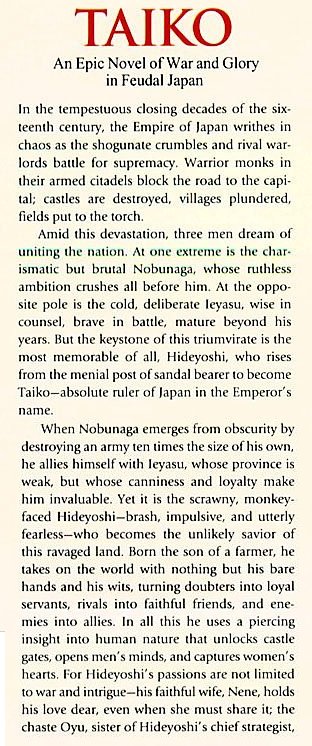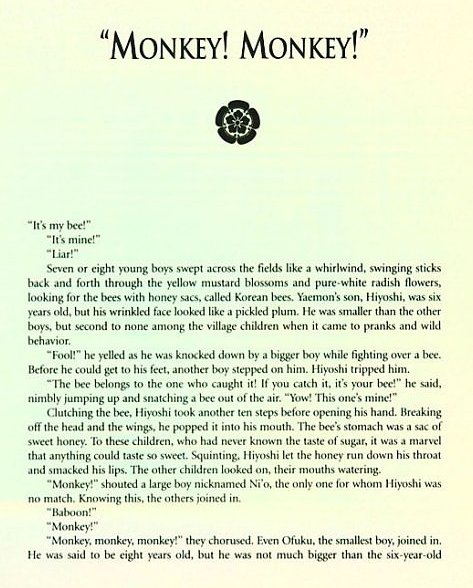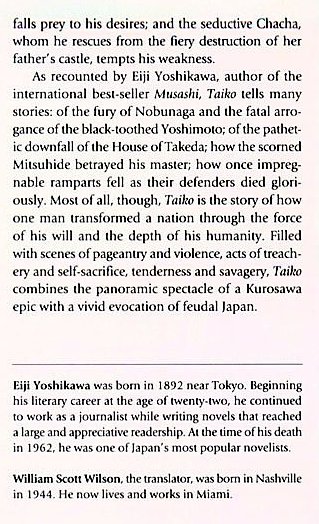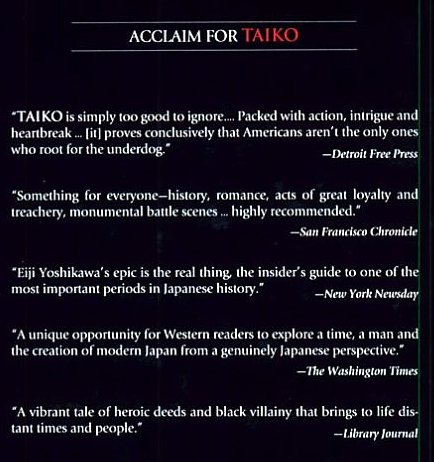 |
 |
Taiko by Eiji Yoshikawa - in English
Buy now for
$27.95
(regularly $32.95) 
We ship worldwide. Bulk and academic discounts available -- contact us for pricing.
Ships in 3 - 5 business days.
Eiji Yoshikawa (Translated by William Scott Wilson)
Tokyo: Kodansha International, 1992 [1967]; Pages: 926
Please see details for a review.
|
Product ID:
102507 ISBN-10: 4770026099 |
Front Cover

Page 7 - excerpt from book:

Back Flap:

Back Cover:

During the 16th century, the crumbling Ashikaga shogunate plunged Japan into the chaos of a brutal and incessant civil strife. As the country became fragmented, local daimyo jostled for power and the increase of their land holdings. Three people would overcome the obstacles in their pursuit of a great vision: the unification and pacification of the entire nation. Started by the great general Oda Nobunaga of the small province of Owari, continued under his retainer Toyotomi Hideyoshi, and finally completed under the aging Tokugawa Ieyasu of Mikawa, the struggle to subdue the other great clans and bring prosperity to the ravaged land is an inspiring, if bloody, tale of courage, imagination, and political intrigue. Yoshikawa's superb novel is about the second of these great men, Hideyoshi, commonly known as The Taiko after the title given to him by the Emperor. As the author's other famous novel MUSASHI (also available in English), TAIKO is an engrossing brisk narrative, close enough to the historical reality, and yet fictionalized enough to give readers a taste of the spirit of the times.
The story follows Hideyoshi's inauspicious youth and his gradual ascent up the ladders of power as he moves from a sandal-bearer to one of the most powerful retainers of Oda Nobunaga. Then, following Nobunaga's murder at the hands of Akechi Mitsuhide, it traces Hideyoshi's struggle to maintain his hold on the reigns of government against the usurpation of various Oda retainers, the plotting of Nobunaga's two surviving sons, and the patient, yet menacing, presence of the Tokugawa. The narrative is extremely engaging, with much attention paid to battles (not surprising for that day and age), but also to Hideyoshi's preference for diplomacy over war, and his grandiose plans to build a new nation. As befits a true protagonist, the Taiko is always one step ahead of his most cunning enemies, he is loyal to a fault, and able to generate faith and goodwill in himself. Despite his exterior (Monkey face), he seems to have little problems with the ladies either. Therein lies the only fault of this novel: Hideyoshi is so likable, he appears terribly one-dimensional. The book conveniently ends before his disastrous latter years (the Korean campaign, and his gradual descent into madness), but even without them, it would appear that his only weakness is for gallivanting with the opposite sex. Although Nene is repeatedly painted as the faithful wife, no attention is paid to why she chose him in the first place, and what restrained her so much later on. To me, Hideyoshi's excessive deference to his mother was comical, and somewhat annoying as well.
In terms of historical reality, Yoshikawa seems to justify Oda Nobunaga's actions, even when their cruelty and barbarism are beyond dispute. There's hardly a disagreement about the bloodthirsty ways of his reign. Yet, the author manages to "approve" the slaughter of the warrior monks at Mount Hiei. I would suggest reading Sanson's A HISTORY OF JAPAN, 1334-1615 for a more balanced look at the events. Nevertheless, Yoshikawa's novel is superb in at least one crucial respect: it manages to make comprehensible the Way of the Samurai to the extent that few other works do. Such a complex mixture of loyalty, honor, calculation, and greed is bound to baffle the foreigner (although I was helped along by Eiko Ikegami's THE TAMING OF THE SAMURAI, an excellent sociological treatment of the samurai class and the bakufu state).
This book is definitely worth reading. One would also want to see some of the many period films that deal with events from this period. For example, Kurosawa Akira's KAGEMUSHA depicts the struggle to preserve the Takeda clan after the death of Takeda Shingen, the lord of Kai and one of the perennial enemies of the Oda. Seeing some of these films would certainly enhance one's appreciation for the history of Japan, especially as it relates to the story of its unification.
Review © 2001 Branislav L. Slantchev |
|


